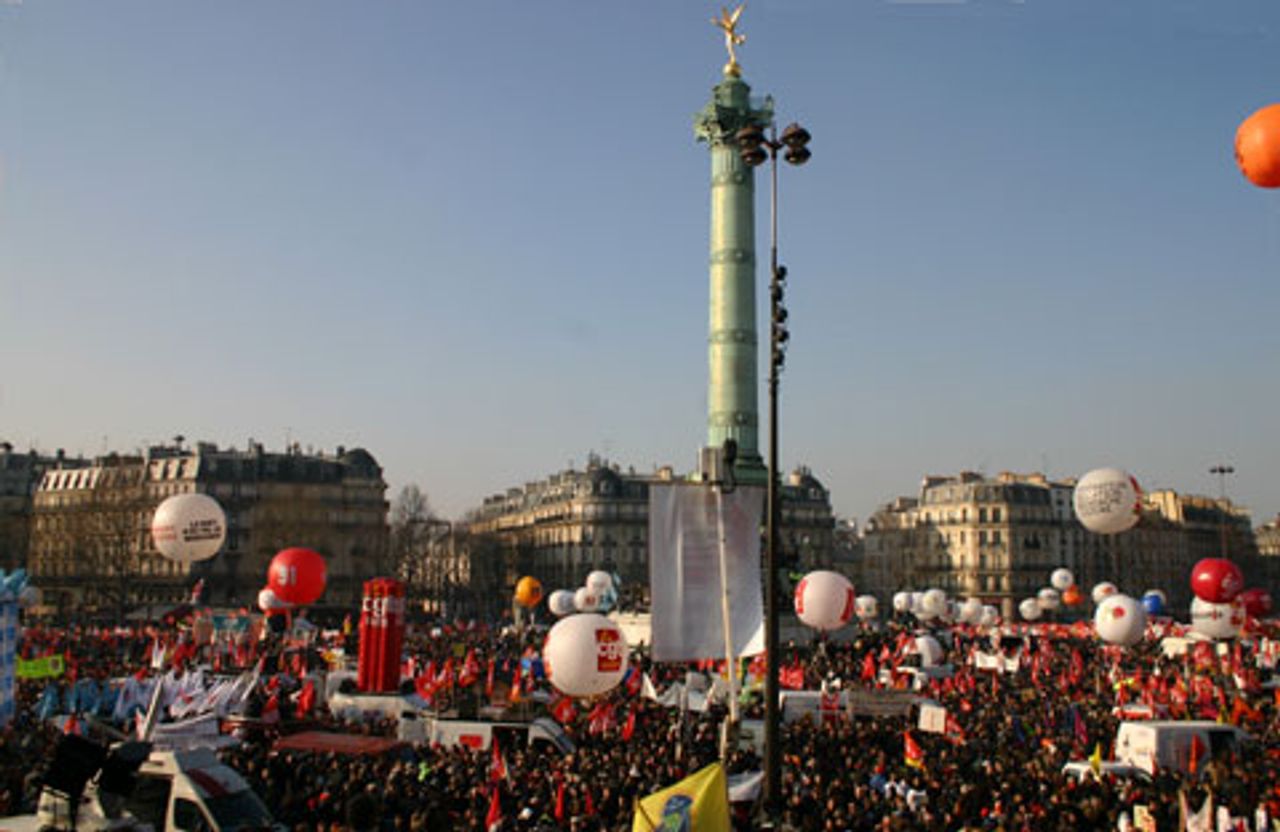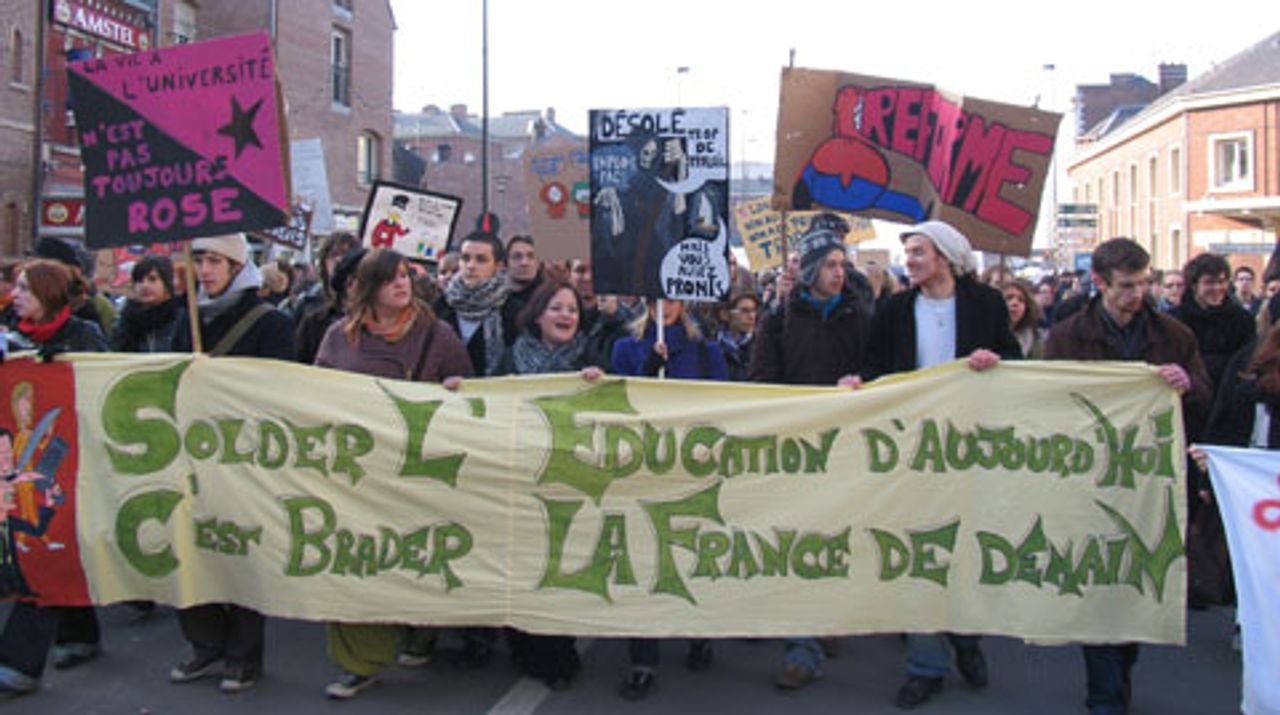 Demonstrators in Paris
Demonstrators in ParisThursday’s day of action throughout France in defence of jobs, the purchasing power of wages and social services, called by the eight major trade union federations, brought an estimated 2.5 million workers and youth onto the streets of some 200 cities and towns. Some small towns reported the largest demonstrations in many years. Workers went on strike in great numbers, as did high school and university students.
Opinion polls indicate that up to three quarters of the French population support or sympathise with the strike.
The trade unions that called the day of action have given no indication of plans to continue or extend the mobilisation and merely state they intend to meet on Monday, but are waiting to see what right-wing President Nicolas Sarkozy will do.
The mass popular movement is driven by the rapidly deteriorating economic situation. A wave of sackings and plant closures in the private sector has led to the destruction of 100,000 jobs in the last three months. This has been aggravated by partial closures and short-time working, particularly in the steel and motor industries. Meanwhile, the Sarkozy government has launched an offensive in the public services (health, education, social welfare) targeting jobs and conditions of work.
Thursday’s mobilization expressed the feelings of millions of workers and young people. The French working class will not accept impoverishment as the price of an economic crisis, for which it bears no responsibility, to maintain the profits and privileges of those who are responsible.
 University students in Amiens, the banner reads: "Selling education cheap today means selling France cheap tomorrow"
University students in Amiens, the banner reads: "Selling education cheap today means selling France cheap tomorrow"
Many placards and homemade banners at the various protests expressed anger and resentment at the €360 billion bailout plan for the banks and the €26 billion in aid for private enterprise.
A group of primary school teachers in Amiens, for example, held a 30-metre banner that read, “Millions for the bankers, asphyxiation of education from the nurseries to the universities.”
The biggest demonstration took place in Paris in the afternoon, estimated at 65,000 by the police and 300,000 by the organisers. WSWS correspondents report a massive gathering representing all age groups, largely dominated by workers from the public services.
The day started with morning demonstrations in Marseille (24,000, according to the police, and 200,000-300,000 according to the CGT (General Confederation of Labour, close to the Communist Party); 20,000-53,000 in Lyon; 34,000-80,000 in Bordeaux; 25,000-50,000 in Rennes.
In Bordeaux there were 60,000 protesters (by CGT estimates), many of them from small firms, and also supermarket workers from Carrefour and Auchan, marching behind a banner reading: “The crisis is them, we are the solution.”
In eastern France, over 20,000 marched in Nancy and 7,000 to 20,000 in Strasbourg.
Over 30 percent of the 5 million workers in the public services (education, public health, local government) were on strike. Also on strike were nearly 40 percent of rail workers, 48 percent of Paris metro drivers, 30 percent of the EDF electric utility staff, 28 percent of postal workers, nearly half of primary teachers and a third of secondary teachers, 30 percent of France Télécom workers, 32 percent of urban transport workers in France’s major cities, 16 percent at the Crédit Lyonnais bank and 10 percent at the Renault car plants.
Radio France and France Télévision services were disrupted and rail traffic was reduced, in some cases by 50 percent. Air traffic was disrupted.
The comments of the various leading trade union officials expressed their complacency and lack of perspective.
Jean-Claude Mailly of Force Ouvrière (Workers Power), France’s third-largest union confederation, declared: “We are not considering the hypothesis that we are going to demonstrate every week, that’s not it—but it’s necessary too for the government to respond.”
Bernard Thibault, leader of the CGT, said that the day’s mobilisations equalled those at the height of the movement against the CPE (first job contract) in 2006, but was pleased to note that this time “there are far fewer young people and many more workers from the private sector.” He said there would be further action, but did not specify what or when it would be.
The comments of François Chérèque of the CFDT (French Democratic Confederation of Labour, oriented to the Socialist Party) expressed the general desire of the union bureaucracies to reach a deal with Sarkozy. “Now it’s up to the government to bring answers” in regard to a “stimulus package with concrete measures for workers, and after that we will decide on further plans for the movement.”
WSWS supporters in Paris, Marseille, Nancy and Amiens handed out thousands of copies of the WSWS Editorial Board statement, “Workers need a socialist perspective to fight the economic crisis,” which called for “the industrial and political mobilization of the entire working class for the purpose of converting the banks and other major industries into public utilities—democratically managed and overseen by the workers—in France and internationally.”
The statement also argued that “The most basic requirement of this struggle is a political break with the trade union bureaucracy and the French political establishment, which are promoting unviable, nationally-based responses to the crisis, and the building of a new political leadership in the working class on the basis of a revolutionary socialist program that places the economy under the democratic control of the working class.”
